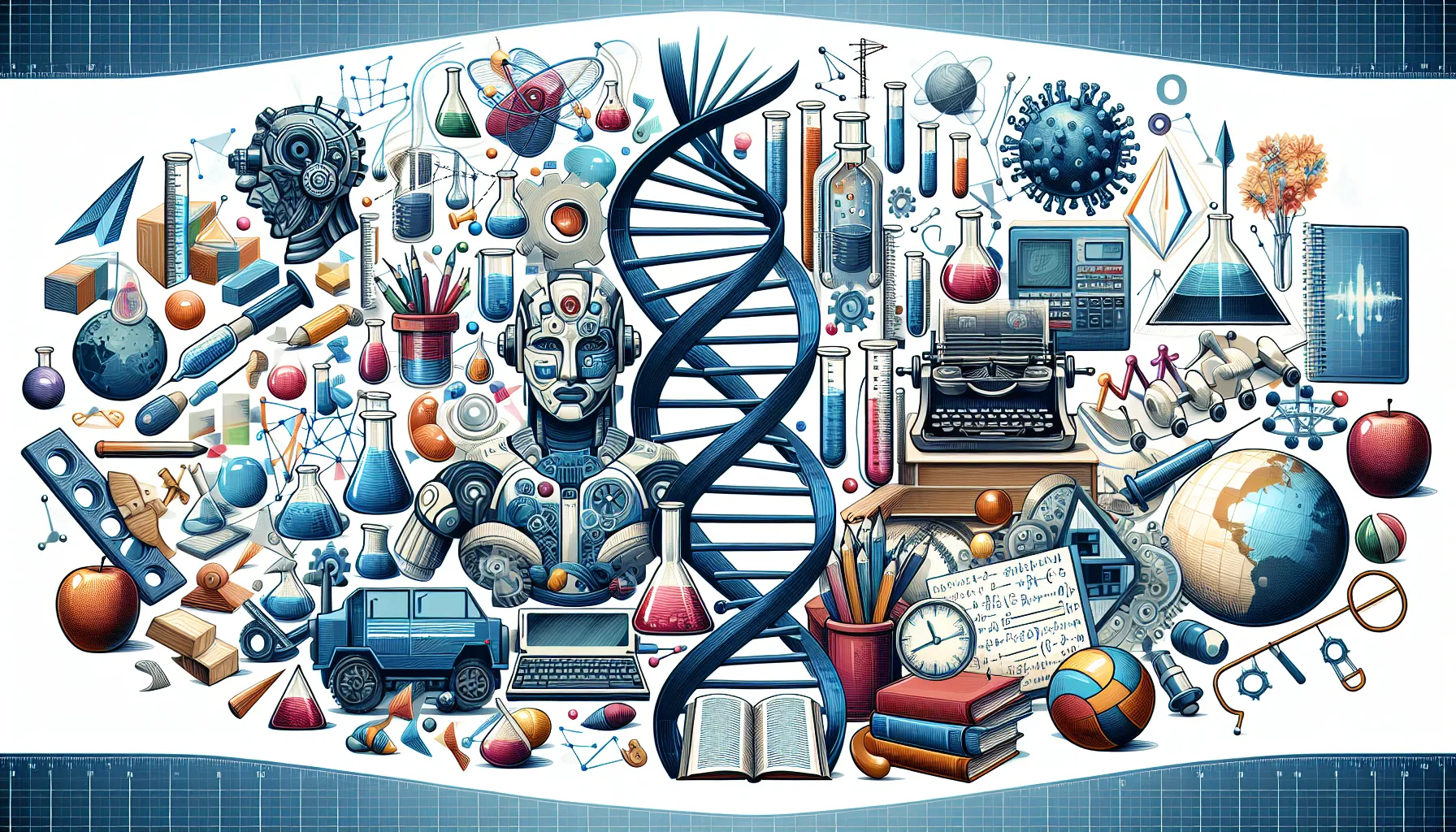Interdisciplinary learning in education has become an increasingly popular topic in IELTS Writing Task 2 exams. This subject reflects the growing importance of cross-disciplinary approaches in modern education systems. Based on recent trends, we can expect to see more questions related to this theme in future IELTS exams. Let’s explore a relevant question that has appeared in past tests and analyze how to craft effective responses.
Analyzing the Question
Some people think that school children should study a wide range of subjects. Others believe that they should focus on subjects that are most relevant to their future careers. Discuss both these views and give your own opinion.
This question directly addresses the debate between a broad, interdisciplinary education and a more focused, career-oriented approach. It requires candidates to:
- Discuss the benefits of studying a wide range of subjects
- Explore the advantages of focusing on career-relevant subjects
- Provide a personal opinion on the issue
Let’s examine two sample essays that tackle this question, one aiming for Band 8 and another for Band 6.
Band 8 Essay Sample
The ongoing debate about the breadth versus depth of education for school children is a crucial one in shaping future generations. While some advocate for a diverse curriculum encompassing various subjects, others argue for a more targeted approach focusing on career-specific skills. In my opinion, a balanced combination of both approaches is ideal for nurturing well-rounded individuals capable of thriving in an ever-changing world.
Proponents of a broad education argue that exposing children to a wide range of subjects fosters creativity, critical thinking, and adaptability. This interdisciplinary approach allows students to draw connections between different fields of knowledge, enhancing their problem-solving skills and intellectual flexibility. For instance, a student studying both literature and science may develop a unique perspective that combines analytical and creative thinking, potentially leading to innovative solutions in their future career.
On the other hand, those favoring a career-focused curriculum contend that it better prepares students for the job market. By concentrating on subjects directly relevant to their future professions, students can develop specialized skills and knowledge that make them more competitive in their chosen fields. This approach can lead to increased employability and potentially higher job satisfaction as individuals are well-prepared for their careers from an early age.
In my view, the ideal educational approach lies in striking a balance between these two perspectives. A foundation in core subjects such as mathematics, science, language, and humanities is essential for developing fundamental skills and a broad knowledge base. However, as students progress, they should have the opportunity to specialize in areas aligned with their interests and career aspirations. This balanced approach ensures that students are well-rounded individuals with the ability to adapt to different situations while also possessing the specialized skills required for their chosen careers.
Moreover, in today’s rapidly evolving job market, the ability to integrate knowledge from various disciplines is increasingly valuable. Many of the most innovative solutions and groundbreaking discoveries occur at the intersection of different fields. By providing students with a diverse educational background, we equip them with the tools to navigate an uncertain future and contribute meaningfully to society.
In conclusion, while there are merits to both a broad and focused educational approach, I believe that a carefully balanced curriculum that combines wide-ranging subjects with opportunities for specialization is the most beneficial for school children. This approach not only prepares them for specific careers but also cultivates the versatility and creativity needed to thrive in our complex, interconnected world.
(Word count: 398)

Analysis of Band 8 Essay
This essay demonstrates several key features that contribute to its high band score:
-
Clear structure: The essay follows a logical structure with a clear introduction, body paragraphs discussing both views, and a conclusion that summarizes the main points and restates the writer’s opinion.
-
Cohesion and coherence: The essay uses a variety of linking words and phrases to connect ideas smoothly, such as “On the other hand,” “Moreover,” and “In conclusion.”
-
Lexical resource: The writer employs a wide range of vocabulary accurately and appropriately, including phrases like “fostering creativity,” “intellectual flexibility,” and “groundbreaking discoveries.”
-
Grammatical range and accuracy: The essay demonstrates a variety of complex sentence structures with minimal errors, showcasing a high level of grammatical control.
-
Task response: The essay fully addresses all parts of the task, discussing both views and providing a clear, well-supported personal opinion.
-
Ideas development: Each point is well-explained and supported with relevant examples or elaboration.
Band 6 Essay Sample
There is a debate about what subjects school children should study. Some people think they should learn many different subjects, while others believe they should focus on subjects that will help them in their future jobs. I will discuss both ideas and give my opinion.
Studying many subjects can be good for children because it helps them learn about different things. When students learn about science, history, art, and math, they can understand the world better. This can make them more creative and able to solve problems in different ways. For example, a student who learns both music and math might see connections between the two subjects that others don’t see.
However, some people think it’s better for students to focus on subjects that will help them in their future careers. If students spend more time on subjects related to their future jobs, they can become experts in those areas. This might help them get better jobs when they finish school. For instance, if a student wants to be a doctor, they might want to spend more time studying science and less time on other subjects.
In my opinion, I think it’s important for students to learn about many subjects when they are young. This helps them discover what they like and what they are good at. As they get older, they can start to focus more on subjects that will help them in their future careers. This way, students can have a good general knowledge but also be prepared for their jobs.
Learning different subjects can also help students in unexpected ways in their future careers. For example, a business person who knows about art might be better at designing products that people like. A doctor who understands psychology might be better at talking to patients.
In conclusion, while there are good reasons for both studying many subjects and focusing on career-related subjects, I believe a mix of both is best. Students should learn about many things when they are young and then start to focus more on their career subjects as they get older. This will help them be successful in their jobs and in life.
(Word count: 351)
Analysis of Band 6 Essay
This essay demonstrates several characteristics of a Band 6 response:
-
Task response: The essay addresses all parts of the task, discussing both views and offering a personal opinion. However, the ideas could be more fully developed.
-
Coherence and cohesion: The essay has a clear structure with introduction, body paragraphs, and conclusion. Basic linking words are used, but more sophisticated cohesive devices could improve the flow.
-
Lexical resource: The vocabulary used is generally appropriate, but lacks the sophistication and range of higher band scores. There is some attempt at using less common vocabulary (e.g., “connections,” “experts”).
-
Grammatical range and accuracy: The essay uses a mix of simple and complex sentences with generally good control, though there is room for more variety in sentence structures.
-
Ideas development: While the main points are presented clearly, the examples and explanations could be more detailed and specific to achieve a higher band score.
Key Vocabulary to Remember
-
Interdisciplinary (adjective) /ˌɪn.tə.dɪsˈɪp.lɪ.nər.i/: Involving two or more academic disciplines.
-
Curriculum (noun) /kəˈrɪk.jə.ləm/: The subjects comprising a course of study in a school or college.
-
Adaptability (noun) /əˌdæp.təˈbɪl.ə.ti/: The quality of being able to adjust to new conditions.
-
Innovative (adjective) /ˈɪn.ə.və.tɪv/: Introducing new ideas; original and creative in thinking.
-
Specialization (noun) /ˌspeʃ.əl.aɪˈzeɪ.ʃən/: The process of concentrating on and becoming expert in a particular subject or skill.
-
Versatility (noun) /ˌvɜː.səˈtɪl.ə.ti/: The ability to adapt or be adapted to many different functions or activities.
-
Groundbreaking (adjective) /ˈɡraʊnd.breɪ.kɪŋ/: Innovative; pioneering.
-
Employability (noun) /ɪmˌplɔɪ.əˈbɪl.ə.ti/: The quality of being suitable for paid work.
-
Fundamental (adjective) /ˌfʌn.dəˈmen.təl/: Forming a necessary base or core; of central importance.
-
Integration (noun) /ˌɪn.tɪˈɡreɪ.ʃən/: The act of combining or adding parts to make a unified whole.
Conclusion
The topic of interdisciplinary learning in education is likely to remain relevant in future IELTS Writing Task 2 exams. As we’ve seen, questions on this theme can be approached from various angles, discussing the benefits and drawbacks of broad versus focused education.
To prepare for similar topics, consider practicing with these potential questions:
- Some argue that the traditional separation of subjects in schools is outdated. To what extent do you agree or disagree?
- Discuss the advantages and disadvantages of implementing a project-based learning approach that combines multiple subjects.
- In your opinion, how can schools best prepare students for a rapidly changing job market?
Remember, the key to success in IELTS Writing Task 2 is to fully address the question, provide well-developed ideas with relevant examples, and demonstrate a good command of English language skills. Practice writing essays on these topics and share them in the comments section below for feedback and discussion. This active engagement will help you improve your writing skills and prepare effectively for the IELTS exam.
